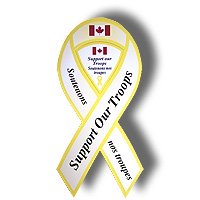On Saturday, February 24th, 2007, Jawed Ludin, the former chief of staff for Afghan President Hamid Karzai, along with is wife and children met with Families of Canadian Soldiers in Afghanistan in Waterloo. Speaking with the support group, Ludin personally thanked a couple of the soldiers in attendance who recently returned from Afghanistan, for the work they did and for attended the group's meeting Saturday in Waterloo and were thanked personally for their committment and endeavours served overseas for his country.
On June 28, 2005 at the Presidential Palace in Kabul, President Hamid Karzai, President of the Islamic Republic of Afghanistan, had issued a decree appointing Mr. Jawed Ludin as the Chief of the Staff of the President.Jawed Ludin was born in Kabul on 16 March, 1973. He went to school at Ghazi High School in Kabul and went to university in London, the UK and earned his Masters Degree in Politics and Sociology in 2001. Jawed Ludin also has experience of working for international organizations in the areas of management, international development and public relations. He has served as the Spokesman and Director of communications of the President since May, 2003.
On Saturday, February 24th, 2007, Jawed Ludin, the former chief of staff for Afghan President Hamid Karzai, currently visiting family in Waterloo, met with Families of Canadian Soldiers in Afghanistan in Waterloo.
The Taliban insurgency in Afghanistan would be dead overnight if Pakistan were forced to stop supporting them, says a senior Afghanistan government official.
"The root and the sources of terrorist indoctrination, terrorist support, terrorist mobilization, terrorist financing, terrorist training and terrorist launching -- all of this happens to be based in Pakistan," Ludin said.
Every Canadian soldier who has served in Afghanistan is viewed as a hero by the overwhelming majority of the people there, Ludin said.
"Afghanistan is grateful obviously to have Canada on its side," Ludin said.
The bombings in Madrid and London, as well as the attacks of 9/11, are all linked to terrorist infrastructure in Afghanistan and Pakistan, Ludin said.
"It would obviously be easier and more comfortable for all Canadians and their soldiers to be back in Canada, but life is not always about easy choices. The difficult choice is the right choice, and that's to be there," Ludin said.
The Italian prime minister recently saw his government fall over his support for keeping
He helped the United Nations organize the Bonn conference of November 2001 that laid out the democratic framework for a post-Taliban Afghanistan. He returned to Afghanistan to work for the president's office in May 2003.
"There is a large consensus internationally that it is vital for this country to become secure and stable again in order for the world to be safe from the threat of terrorism," Ludin said.
NDP Leader Jack Layton, and other MPs have called for a major change of direction in Canada's mission in Afghanistan. Those critics want Canadian troops to focus more on development work, rather than fighting.
But Ludin said both are needed at the same time.
"It's through development that you will ensure the long-term sustainability of this effort."
"You have to defeat the enemy of stability in Afghanistan in order to be able to help Afghanistan recover and develop economically," Ludin said.
The roots of terrorism in Afghanistan were planted in the 1980s. Money from Saudi Arabia was used by Pakistan's intelligence agencies to set up religious schools (Madrassas) where young recruits were indoctrinated into extremist Islam.
The Soviets were driven out of Afghanistan, but the Madrassas remained.
The Taliban came out of these schools. Talib means religious student.
Ludin said Pakistan and Afghanistan never accepted the border between the two countries when Pakistan was created in 1947.
And now Pakistani intelligence uses Islamic extremism to undermine any nationalist tendencies in the provinces that border Afghanistan.
The Muslim radicals running the Madrassas, the Taliban and Pakistani intelligence agency known as ISI form what Ludin calls an evil triangle.
"This triangle is the evil triangle that has to be dismantled if the world is ever going to be safe from terrorism" Ludin said.
For more information on the Families of Canadian Soldiers in Afghanistan support group, call Kerry Townson at 519-888-9398 or e-mail focsia@hotmail.com
On June 28, 2005 at the Presidential Palace in Kabul, President Hamid Karzai, President of the Islamic Republic of Afghanistan, had issued a decree appointing Mr. Jawed Ludin as the Chief of the Staff of the President.Jawed Ludin was born in Kabul on 16 March, 1973. He went to school at Ghazi High School in Kabul and went to university in London, the UK and earned his Masters Degree in Politics and Sociology in 2001. Jawed Ludin also has experience of working for international organizations in the areas of management, international development and public relations. He has served as the Spokesman and Director of communications of the President since May, 2003.
On Saturday, February 24th, 2007, Jawed Ludin, the former chief of staff for Afghan President Hamid Karzai, currently visiting family in Waterloo, met with Families of Canadian Soldiers in Afghanistan in Waterloo.
The Taliban insurgency in Afghanistan would be dead overnight if Pakistan were forced to stop supporting them, says a senior Afghanistan government official.
"The root and the sources of terrorist indoctrination, terrorist support, terrorist mobilization, terrorist financing, terrorist training and terrorist launching -- all of this happens to be based in Pakistan," Ludin said.
Every Canadian soldier who has served in Afghanistan is viewed as a hero by the overwhelming majority of the people there, Ludin said.
"Afghanistan is grateful obviously to have Canada on its side," Ludin said.
The bombings in Madrid and London, as well as the attacks of 9/11, are all linked to terrorist infrastructure in Afghanistan and Pakistan, Ludin said.
"It would obviously be easier and more comfortable for all Canadians and their soldiers to be back in Canada, but life is not always about easy choices. The difficult choice is the right choice, and that's to be there," Ludin said.
The Italian prime minister recently saw his government fall over his support for keeping
He helped the United Nations organize the Bonn conference of November 2001 that laid out the democratic framework for a post-Taliban Afghanistan. He returned to Afghanistan to work for the president's office in May 2003.
"There is a large consensus internationally that it is vital for this country to become secure and stable again in order for the world to be safe from the threat of terrorism," Ludin said.
NDP Leader Jack Layton, and other MPs have called for a major change of direction in Canada's mission in Afghanistan. Those critics want Canadian troops to focus more on development work, rather than fighting.
But Ludin said both are needed at the same time.
"It's through development that you will ensure the long-term sustainability of this effort."
"You have to defeat the enemy of stability in Afghanistan in order to be able to help Afghanistan recover and develop economically," Ludin said.
The roots of terrorism in Afghanistan were planted in the 1980s. Money from Saudi Arabia was used by Pakistan's intelligence agencies to set up religious schools (Madrassas) where young recruits were indoctrinated into extremist Islam.
The Soviets were driven out of Afghanistan, but the Madrassas remained.
The Taliban came out of these schools. Talib means religious student.
Ludin said Pakistan and Afghanistan never accepted the border between the two countries when Pakistan was created in 1947.
And now Pakistani intelligence uses Islamic extremism to undermine any nationalist tendencies in the provinces that border Afghanistan.
The Muslim radicals running the Madrassas, the Taliban and Pakistani intelligence agency known as ISI form what Ludin calls an evil triangle.
"This triangle is the evil triangle that has to be dismantled if the world is ever going to be safe from terrorism" Ludin said.
For more information on the Families of Canadian Soldiers in Afghanistan support group, call Kerry Townson at 519-888-9398 or e-mail focsia@hotmail.com





























No comments:
Post a Comment